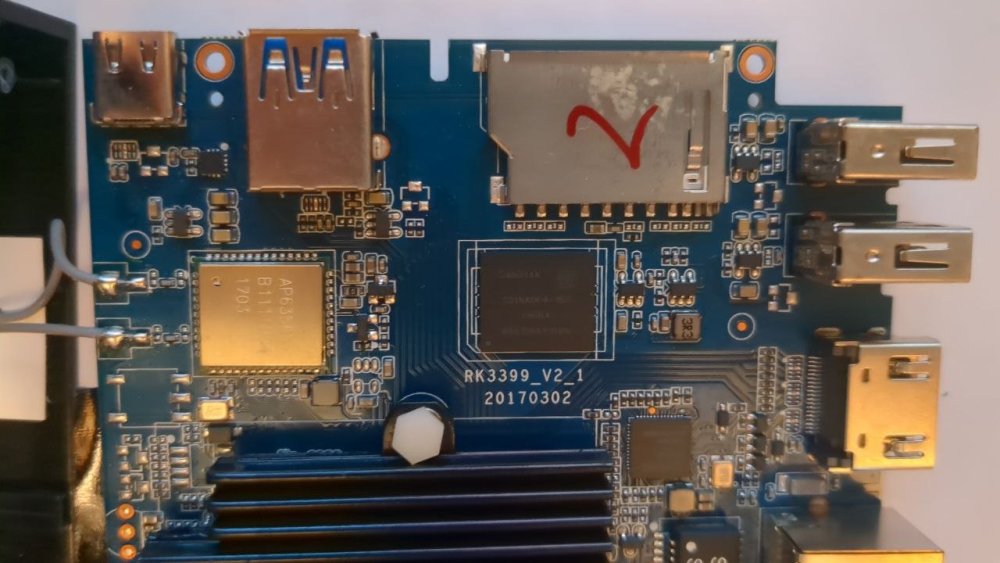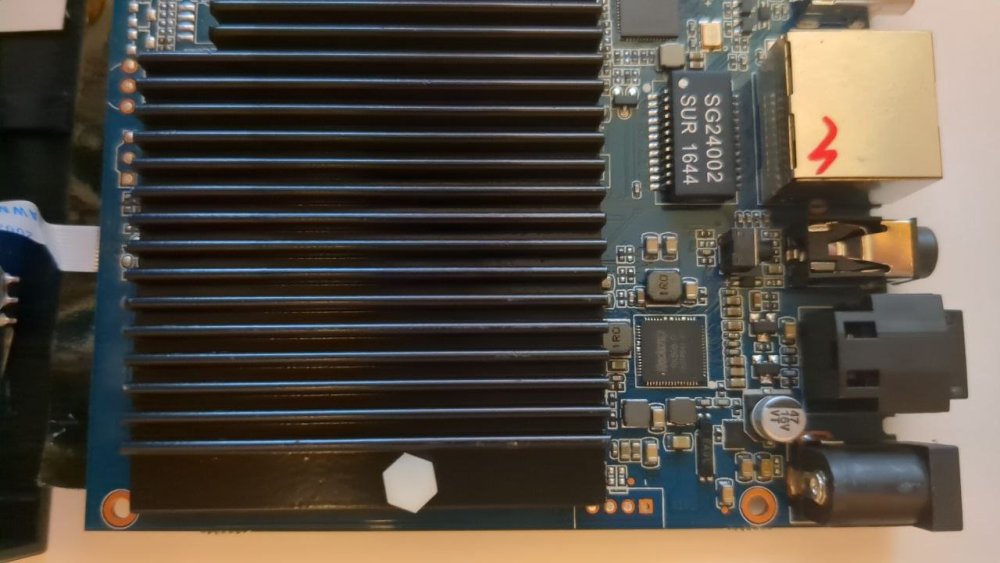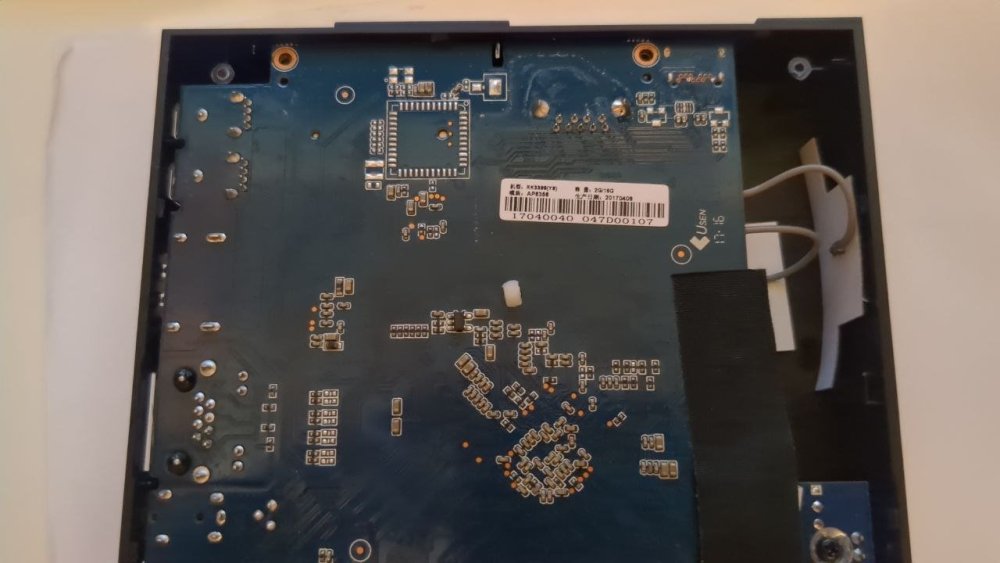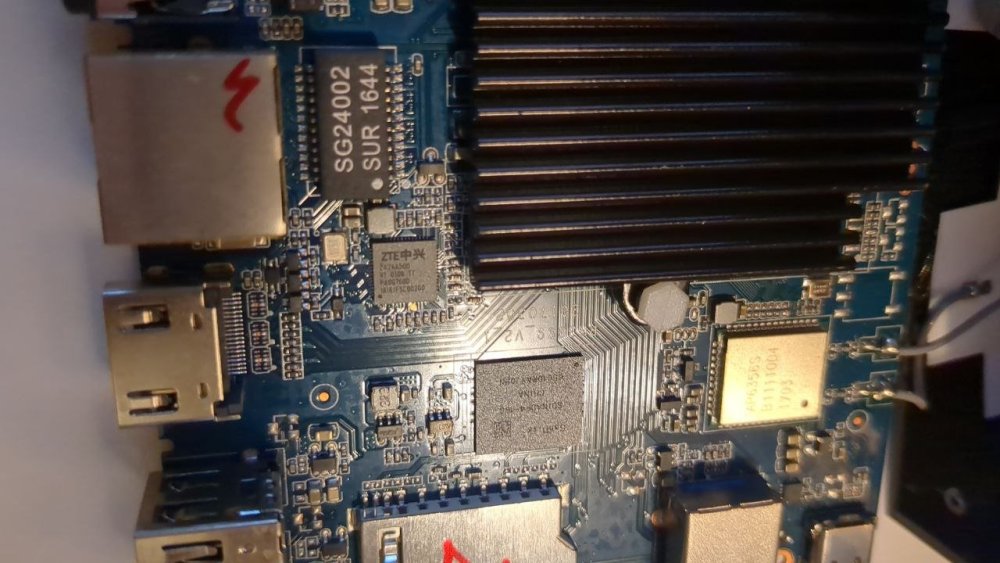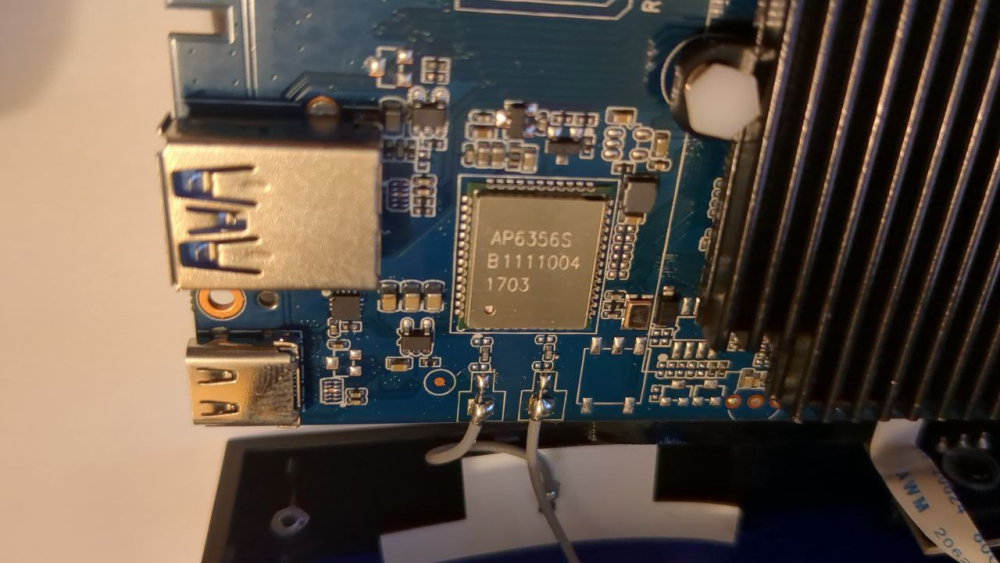All Activity
- Past hour
-

Need help with video decode acceleration on NanoPi R6S
Dantes replied to Blind55's topic in NanoPi R6S/R6C
Or wait until the end of the year when 6.18 will be the new Linux version, that enables pretty much everything. RK3588 Mainline Linux Status: https://gitlab.collabora.com/hardware-enablement/rockchip-3588/notes-for-rockchip-3588/-/blob/main/mainline-status.md If you really need a bleeding edge working mediaplayer, LibreElec has experimental support for R6S/R6C: Thread: https://forum.libreelec.tv/thread/29953-le13-testing-for-rk3288-rk3328-rk3399-rk3566-rk3568-rk3576-rk3588/ Downloads: https://chewitt.libreelec.tv/testing/ -
That's why I am here To ask for help I could not find any installable packages I am a novice user
-
Why? There is experimental support now for arm64/aarch64. It even has .deb packages https://nightlies.tbb.torproject.org/nightly-builds/tor-browser-builds /<date>/nightly-linux-aarch64/ Can't get closer to the source than that Edit: @c0rnelius: you were 48mins ahead of me
- Today
-

Installing armbian on Yundoo Y8 TV box (RK3399)
maka replied to FucusMeDeep's topic in Rockchip CPU Boxes
You can not use android dtb. You must try without It or try the rk3399 files included in the sdcard. i cant see the second rockchip (pmic) -

H3 cedrus video acceleration, device tree problem?
Ryzer replied to schunckt's topic in Allwinner sunxi
Firstly can you actually connect to the repo without issues? I my case I was getting timeouts and i suspect it was being blocked by my ISP for whatever reason and to work around I to tether my SBC to mobile for internet via mobile data then install the packages this way. This is my current ffmpeg: ffmpeg -version ffmpeg version 5.1.4-0+deb12u1.v4l2request Copyright (c) 2000-2023 the FFmpeg de velopers built with gcc 12 (Debian 12.2.0-14) configuration: --prefix=/usr --extra-version=0+deb12u1.v4l2request --toolchain=h ardened --libdir=/usr/lib/arm-linux-gnueabihf --incdir=/usr/include/arm-linux-gn ueabihf --arch=arm --enable-gpl --disable-stripping --enable-gnutls --enable-lad spa --enable-libaom --enable-libass --enable-libbluray --enable-libbs2b --enable -libcaca --enable-libcdio --enable-libcodec2 --enable-libdav1d --enable-libflite --enable-libfontconfig --enable-libfreetype --enable-libfribidi --enable-libgls lang --enable-libgme --enable-libgsm --enable-libjack --enable-libmp3lame --enab le-libmysofa --enable-libopenjpeg --enable-libopenmpt --enable-libopus --enable- libpulse --enable-librabbitmq --enable-librist --enable-librubberband --enable-l ibshine --enable-libsnappy --enable-libsoxr --enable-libspeex --enable-libsrt -- enable-libssh --enable-libsvtav1 --enable-libtheora --enable-libtwolame --enable -libv4l2 --enable-v4l2-request --enable-v4l2-m2m --enable-libvidstab --enable-li bvorbis --enable-libvpx --enable-libwebp --enable-libudev --enable-libx265 --ena ble-libxml2 --enable-libxvid --enable-libzimg --enable-libzmq --enable-libzvbi - -enable-lv2 --enable-omx --enable-openal --enable-opencl --enable-opengl --enabl e-sdl2 --disable-sndio --enable-libjxl --enable-pocketsphinx --enable-librsvg -- enable-libdc1394 --enable-libdrm --enable-libiec61883 --enable-chromaprint --ena ble-frei0r --enable-libx264 --enable-libplacebo --enable-librav1e --enable-share Admittedly not the most up to date as it has been a while since I last attempted. From what I can tell from the latest pages it looks like using drm* has now been replaced with v4l2request more recently. I doubt it would specifically related to the duo2 and more likely at the soc dtsi definitions level. Now I encountered many of the same problems you did earlier but the older A10/A20 VE is limited to physically access only the first 256mb of memory. The H3 does not have the same constraints. @robertoj You are using a more modern setup? what is your current reported ffmpeg version. -

Installing armbian on Yundoo Y8 TV box (RK3399)
nobitakun replied to FucusMeDeep's topic in Rockchip CPU Boxes
I attached some pictures of the device inside, I don't know if they can be of any help. I tried to use te dtb extracted from Android with the Armbian for Firefly-RK3399 and it does not boot. I configure the extlinux.conf file as advised, but the same moment I insert the SD card and turn on the device, the red light never turns blue. I tried that board because I've read in some forum that is similar to this device, but I know that's kind of hit and miss. At least I expected to see something on screen, even if it threw tons of errors, because I assume the dtb file is not the problem so the issue should be somewhere else that needs to be modified. Much appreciated for the help -
Dear all, I got myself an Radxa Rock 5 ITX+ as I thought I'd saw that this board had premium support. After it arrived, I saw that only the ITX (non-plus) variant had premium support, which since latest Armbian release some days ago seems to has been downgraded to standard support. I cleared both the eMMC and SPI flash to make sure the preinstalled OS were gone and would not interfere with the boot up process. Then I built myself a latest image with trixie and vendor kernel but I realized that (after booting from sdcard successfully), the Nvme was never picked up. The ITX+ has two M.2 full-size slots instead of only one - and is missing the SATA controller instead. To make sure I did nothing wrong with the building process I grabbed myself some old images like e.g. Armbian_24.11.1_Rock-5-itx_bookworm_vendor_6.1.75_cinnamon-backported-mesa_desktop.img.xz Armbian_25.2.2_Rock-5-itx_bookworm_vendor_6.1.99_cinnamon-backported-mesa_desktop.img.xz but they don't show working Nvmes either. So I got myself the latest nightly Trixie build (Rolling releases images with Armbian Linux v6.1 / Build Date: Sep 6, 2025 / Debian Debian 13 (Trixie)) from https://www.armbian.com/radxa-rock-5-itx/ and booted that, to also see that both populated Nvme slots are not picked up. lspci shows two Nvmes: 0000:01:00.0 Non-Volatile memory controller: Solid State Storage Technology Corporation NVMe SSD M.2 (rev 01) 0001:11:00.0 Non-Volatile memory controller: Solid State Storage Technology Corporation NVMe SSD M.2 (rev 01) Bot dmesg shows issues during boot: [ 14.165404] pci 0001:10:00.0: Primary bus is hard wired to 0 [ 14.165410] pci 0001:10:00.0: bridge configuration invalid ([bus 01-ff]), reconfiguring [ 14.165514] pci 0001:11:00.0: [1e95:3500] type 00 class 0x010802 [ 14.165568] pci 0001:11:00.0: reg 0x10: [mem 0x00000000-0x00003fff 64bit] [ 14.165794] pci_bus 0000:01: busn_res: can not insert [bus 01-ff] under [bus 00-0f] (conflicts with (null) [bus 00-0f]) [ 14.165901] pci 0000:01:00.0: [1e95:3500] type 00 class 0x010802 [ 14.166009] pci 0000:01:00.0: reg 0x10: [mem 0x00000000-0x00003fff 64bit] [ 14.166147] pci 0001:11:00.0: 15.752 Gb/s available PCIe bandwidth, limited by 8.0 GT/s PCIe x2 link at 0001:10:00.0 (capable of 31.504 Gb/s with 8.0 GT/s PCIe x4 link) [ 14.166379] cpu cpu6: l=15000 h=85000 hyst=5000 l_limit=0 h_limit=2208000000 h_table=0 [ 14.166699] pci_bus 0001:11: busn_res: [bus 11-1f] end is updated to 11 [ 14.166721] pci 0001:10:00.0: BAR 8: assigned [mem 0xf1200000-0xf12fffff] [ 14.166729] pci 0001:10:00.0: BAR 6: assigned [mem 0xf1300000-0xf130ffff pref] [ 14.166729] pci 0000:01:00.0: 15.752 Gb/s available PCIe bandwidth, limited by 8.0 GT/s PCIe x2 link at 0000:00:00.0 (capable of 31.504 Gb/s with 8.0 GT/s PCIe x4 link) [ 14.166737] pci 0001:11:00.0: BAR 0: assigned [mem 0xf1200000-0xf1203fff 64bit] [ 14.166785] pci 0001:10:00.0: PCI bridge to [bus 11] [ 14.166792] pci 0001:10:00.0: bridge window [mem 0xf1200000-0xf12fffff] [ 14.168281] pcieport 0001:10:00.0: PME: Signaling with IRQ 128 [ 14.168548] nvme nvme0: pci function 0001:11:00.0 [ 14.168576] nvme 0001:11:00.0: enabling device (0000 -> 0002) [ 14.176536] pci 0000:00:00.0: BAR 8: assigned [mem 0xf0200000-0xf02fffff] [ 14.176542] pci 0000:00:00.0: BAR 6: assigned [mem 0xf0300000-0xf030ffff pref] [ 14.176546] pci 0000:01:00.0: BAR 0: assigned [mem 0xf0200000-0xf0203fff 64bit] [ 14.176569] pci 0000:00:00.0: PCI bridge to [bus 01-ff] [ 14.176573] pci 0000:00:00.0: bridge window [mem 0xf0200000-0xf02fffff] [ 14.177418] pcieport 0000:00:00.0: PME: Signaling with IRQ 138 [ 14.177557] nvme nvme1: pci function 0000:01:00.0 [ 14.177582] nvme 0000:01:00.0: enabling device (0000 -> 0002) [ 14.181202] nvme nvme0: Removing after probe failure status: -19 [ 14.185702] cpu cpu6: EM: OPP:1008000 is inefficient [ 14.185716] cpu cpu6: EM: OPP:816000 is inefficient [ 14.185965] cpu cpu6: EM: created perf domain [ 14.190212] nvme nvme1: Removing after probe failure status: -19 ( full log: https://paste.next.armbian.com/labujaguke.yaml ) Any idea on how to fix this and get them working? That would be really lovely, Thanks a lot for all your support!
-
OK...I think it worked in OrangePi3 LTS 🙂 ...first, clean up the remnants: ................................................................. sudo apt purge v4l2loopback-dkms sudo apt autoremove ............................................................... armbian-config then I had to switch to a different kernel: edge:6.15.4-edge-sunxi64 ....then update the system: apt update / upgrade / reboot ! install from GitHub: v4l2loopback and then: cd ~/v4l2loopback .................................................................... VERSION=$(grep -oP 'PACKAGE_VERSION="\K[^"]+' dkms.conf) sudo cp -r . /usr/src/v4l2loopback-$VERSION sudo dkms add -m v4l2loopback -v $VERSION sudo dkms build -m v4l2loopback -v $VERSION sudo dkms install -m v4l2loopback -v $VERSION dkms status sudo modprobe v4l2loopback ls /dev/video* ................................................................... I guess it's OK now: ................................................................ but in my opinion the module is not working properly 😞
-
It doesn't seem to make a difference:
-
aplay -D plughw:0,0 -f S16_LE -r 48000 -c 2 your_audio_file.wav ? this will force a more common audio format (in case the monitor supports specific audio formats. If not working, no idea, hw detection looks ok.
-
Sorry I mean Which kind of output device: TV, Monitor with build in speakers? I have a HDMI monitor with speakers included. Yes.
-
Sorry I mean Which kind of output device: TV, Monitor with build in speakers? If you try "aplay -D plughw:0,0 your_audio_file.wav", still no sound?
-
Here's the output, shows PCMs for both the HDMI and analog audio outputs: > How do you test the HDMI sound ? speaker-test or aplay (with a .wav file).
-
What does "aplay -L" show ? How do you test the HDMI sound ?
-
The kernel version reported by armbianmonitor (see my first post) is 6.16.4-edge-rockchip64.
-
On what kernel version are you ? HDMI Audio was introduced in the Linux Kernel in 6.15-rc1
-
amixer doesn't show any controls on the first card (and so does alsamixer) - amixer -c 0 shows nothing, while amixer -c 1 has a lot of output, but I think it's just showing the controls for the rockchipes8388 audio card (the analog output, not the HDMI).
-

Installing armbian on Yundoo Y8 TV box (RK3399)
MaxT replied to FucusMeDeep's topic in Rockchip CPU Boxes
I would open the box make photos of the board with silk prints visible and search similar box in a relevant section of tv boxes on this forum. Name on the plastic box means nothing, silk prints on the board and SoC itself might help. -

mxq pro 4k 5g allwinner h313 can't sd card boot
Ducdanh Nguyen replied to Ducdanh Nguyen's topic in Allwinner CPU Boxes
Hello @Nick A i was busy on school and my cable is delivered, i was able to use adb. Could you show me how to dunp the boot.img? @SteeMan, My box is fake and it is allwinner h313, is in 32 bit mode -

Installing armbian on Yundoo Y8 TV box (RK3399)
nobitakun replied to FucusMeDeep's topic in Rockchip CPU Boxes
Finally, I've extracted the dtb file corresponding to the device, from Android. It is for kernel 4.4.16, so I believe it can be done something with it in order to boot Armbian. At least is a beginning -
None of the images are no longer working for me, no matter which recent image I take, the A5E board just remains stuck with a solid blue light (with some green light flickering). I even tried compiling armbian myself, but that also didn't work. The only image working for me is the 25.02 version from earlier this year. I am using the Radxa A5E v1.2 version with 4gb ram. I also mounted the SD card to a linux machine and looked into /var/log for a boot file or reading the journal but I don't see any logs written. Have somebody stumbled unto a solution or does somebody have advice me how I can get the logs to find the culprit?
-
Hi, always check with "amixer" (alsa mixer) if your outputs are not muted.
-

H3 cedrus video acceleration, device tree problem?
schunckt replied to schunckt's topic in Allwinner sunxi
Hi! i already tried this without luck. Based on the version ffmpeg showed it installed the right one. I also did uninstall previous ffmpeg and verified its really gone. I still suspect there is something wrong specific for the duo2. Could you please take a look what exact version ffmpeg does show? T. -

armbian nanopi m4v2 rk3399 mali t864 not working
Giuseppe93 replied to Giuseppe93's topic in NanoPi R4S
I can see that after multiples update that the situation for the video acceleration seems to be better in full HD not in 4K, could you help me to understand how? In addition I'd like to add that I'm still getting problems with my Bluetooth keyboard and touch-pad being laggy especially when there is Ethernet traffic ongoing, i don't know if the bus of the Ethernet, the WiFi and Bluetooth card is shared in this SBC. Could you explain me how can i monitor this problem ? to conclude this morning I got a new packages issue, I runned the command "sudo armbianmonitor -u" and i pubblished the results to: https://paste.armbian.com/geyahoxavi -
Meanwhile, I upgraded the old rebooting (working) orangepi zero(1)s from U-boot "SPL 2019.04-armbian (Nov 18 2019 - 23:36:05 +0100)" to U-boot "SPL 2024.01-armbian-2024.01-S866c-P6b16-Ha5c2-V367a-Bb703-R448a (Apr 29 2025 - 02:50:09 +0000)" and they also now poweroff on reboot. So the problem is clearly u-boot, and not SD card vendor, kernel (they all run the same "6.12.43-current-sunxi #1 SMP Wed Aug 20 16:30:58 UTC 2025 armv7l") or whatever else. I'll see if I can manage to test U-boot v2025.07... Btw, one thing I noticed with old working boot.cmd/scr was that load_addr was "0x44000000" while it is now "0x45000000" - no idea what significance may have.
- 21 replies
-
- Orange Pi Zero
- Orange Pi Zero 2
-
(and 1 more)
Tagged with:

